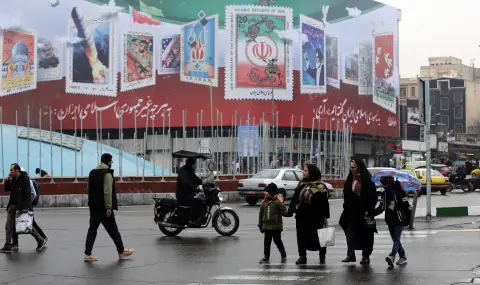After the Israeli strikes on Iranian targets on Saturday 10/26, many people in Iran are sharing their anger on social media. At the same time, they try to better understand what is happening.
Iran has serious economic problems. According to information from the news platform "IranWire", which is maintained by Iranian journalists in exile, Tehran's national currency, the rial, has sharply lost its value due to tensions with Israel. Fears of a regional war have pushed the rial to historic lows against the US dollar. In addition, according to official data, inflation in the last year has reached 33 percent. Prices are expected to continue to rise.
According to the parliament in Tehran, poverty levels in the country have also been rising progressively over the past five years. A third of Iranians can no longer cover their basic needs with their income.
Anger against Hezbollah and Hamas
At the same time, investors are trying to liquidate their assets on the Tehran Stock Exchange, which has led to a standstill in major deals as many await the outcome of these conflicts. Many Iranians increasingly associate their country's economic collapse with the government's financial support for Hezbollah and Hamas. The Lebanese militia Hezbollah is linked to Iran. It and Hamas, which rules the Gaza Strip, are classified as terrorist organizations by Germany, the United States and other countries.
According to the London-based Iranian news channel "Iran International" many people in the country blame the authorities in Tehran for focusing more on conflicts in foreign countries than on problems at home. The discrepancies between official statements and sentiment on the streets could have serious implications for Iran's internal stability, especially if tensions continue to escalate.
Censorship at every turn
According to "Reporters Without Borders" Iran is "one of the most repressive countries in the world when it comes to press freedom". Strict censorship became evident immediately after the Israeli attacks, when Tehran's state media initially reported absolutely nothing.
A journalist from Tehran, whose name DV does not mention for security reasons, says that "nothing can be written, the media does not dare to report anything different from the official position". Members of the press were also prohibited from posting information on their personal profiles on social networks.
Iranian media expert Babak Dorbeiki criticized the restrictions on independent media after the Israeli attack. Dorbeiki is a former adviser and head of the Center for Public Relations and Information during the government of Hassan Rouhani from 2013 to 2021. "The way in which the state media conveys the news at critical moments shows a weakness that is characterized by confusion and lack of coordination," Dorbeiki told DV from London, where he currently lives.
The situation is different in social networks, where people use the so-called VPN (virtual private network) to bypass restrictions. On the Internet, users expressed their anger at the government, asking why they were not informed of the attacks so they could seek asylum. Many also express concerns that there is not a good enough bunker system, considering that the country may be heading for war.
On social networks, some even blame Iran's Supreme Leader Ayatollah Ali Khamenei and the Revolutionary Guard for the escalation with Israel.
Anti-Semitic propaganda
"Anti-Semitic hate speech on Iranian social networks and websites reached a total of 61,000 posts in September," according to an analysis by "IranWire". This is a 98% increase compared to the month of August, the independent platform notes. And official and semi-official channels occupy a leading place in the spread of anti-Semitic messages.
These government efforts to stoke anti-Israel and anti-Semitic sentiment, however, have not led to anti-Israel protests in Iran - unlike in other Arab countries. In Egypt, Jordan, Morocco, the United Arab Emirates, Kuwait and Iraq, thousands took to the streets to protest Israel's war against the terrorist organization Hamas in the Gaza Strip. The war is in response to the attack carried out by Hamas in Israel on October 7, 2023, in which more than 1,200 people were killed and more than 200 people were taken hostage.
"The Iranian people do not want war with Israel... and in fact do not particularly dislike Israel," wrote in "The Atlantic" historian Arash Azizi, a visiting scholar at New York University who studies Iran. Reactions on social media after Saturday's attack also indicated that many Iranians do not want conflict with Israel because they fear the outbreak of a regional war.
According to the critics of the regime, a war against Israel could further deepen the oppression of the population in Iran. "The reality is that a war leads to increased repression and pressure on dissidents, which does not contribute to democracy in Iran," Nazila Golestan, an oppositionist based in Paris, told DV.
Author: Amir Soltanazde
